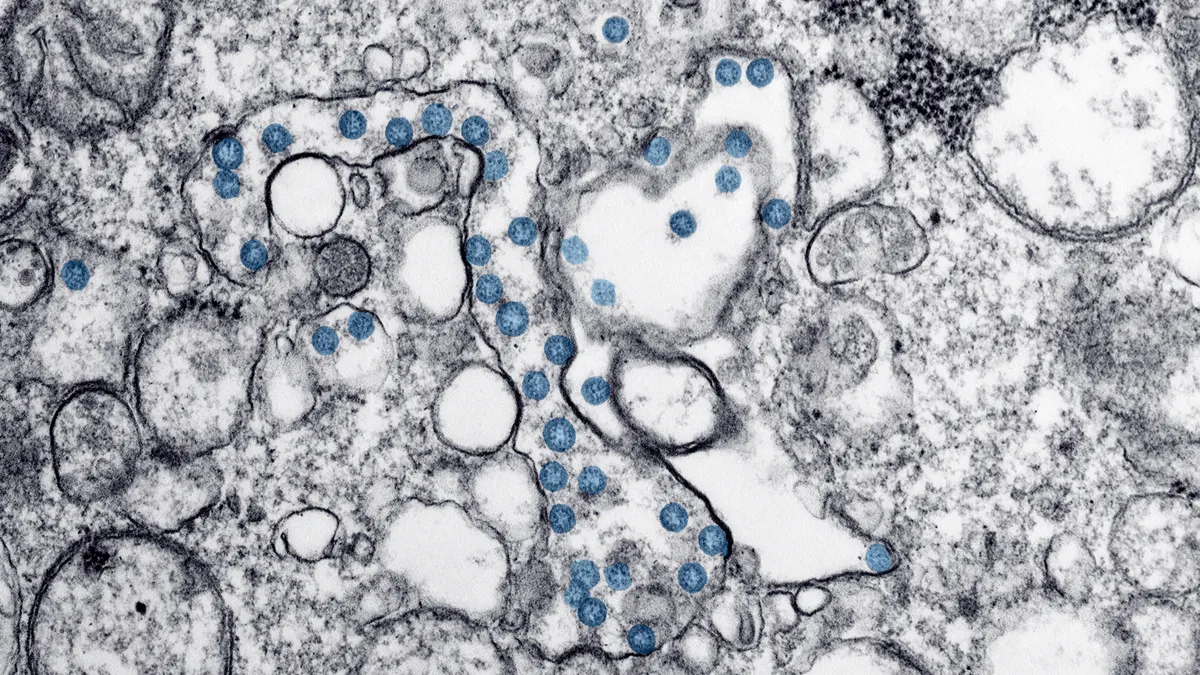Dive Brief:
- Quidel Corporation shared new data late Friday showing its COVID-19 antigen test has 96.7% sensitivity within five days of the onset of patient symptoms.
- The results for the company's Sofia SARS Antigen FIA, which in May was the first such diagnostic to receive FDA emergency use authorization, are in line with the sensitivity rates of polymerase chain reaction (PCR) tests. While PCR testing is believed to typically have a higher accuracy rate than antigen-based diagnostics, Quidel's latest data seems to indicate otherwise. "Lower sensitivity had been an argument we have heard over and over about why antigen testing was not going to be used and this should help put that to bed," William Blair analysts wrote in a note to investors Monday.
- Earlier this month, FDA granted an EUA to a BD antigen test with 84% sensitivity, making it only the second such diagnostic to receive the agency's nod.
Dive Insight:
Unlike PCR tests, which detect viral genetic material, antigen testing is designed to determine if a sample contains proteins found on the surface of the coronavirus, enabling the delivery of results in minutes rather than days.
The tradeoff is that while the slower-to-process PCR tests are typically highly accurate and usually do not need to be repeated, negative results from antigen tests may need to be confirmed with a molecular test, according to the FDA. In particular, antigen tests are not able to definitively rule out active COVID-19 infection, the agency has stated.
However, since the FDA's granting in May of an EUA to Quidel's antigen test, the company contends it has achieved parity with PCR tests.
"Further studies have validated that our Sofia SARS Antigen FIA offers sensitivity that is comparable to PCR within this 5-day window, providing healthcare workers with confidence in their ability to accurately diagnose their patients,” Quidel CEO Douglas Bryant said in a statement.
In an interview on Sunday's Meet the Press, NIH Director Francis Collins said the wait times for test results are "too long" currently, with averages as long as seven days or more. He said the federal government sees tremendous value in rapid point-of care testing provided by the antigen-based diagnostics.
"Most of the tests that are being done right now you have to have the swab, then you send it off to a central laboratory," Collins observed. "We need [tests] that are more on the spot and actually there's a number of new technologies that are coming along that look very promising."
Another advantage of antigen-based diagnostics is that they are cheaper to make. Combined with the fact that they deliver test results much faster than molecular diagnostics, and the fact that sensitivity appears to be getting closer between the two methods, the widespread availability of antigen tests could potentially enable the U.S. to test millions of more Americans per day and detect infections sooner.
“I think that’s the critical aspect here. If we want to get to more mass screening, more mass volume, these tests need to be more affordable,” Abbott CEO Robert Ford told investors on a July 16 second quarter earnings call.
Ford said Abbott is developing its own antigen test but declined to provide specifics in terms of timing. Ford did say antigen tests offer a compelling value proposition compared to molecular testing, emphasizing that Abbott’s goal is to produce a reliable antigen test that’s easy to use and affordable.
William Blair analysts on Monday wrote that Quidel's latest data on its antigen test "takes sensitivity to an almost unthinkable 96.7% and requires no molecular confirmation of negatives for patients with symptoms of five days or less." They contend that "at this level, the performance is on par with many of the molecular tests on the market and is above the performance of the other antigen test on the market from BD."
BD's antigen test might not have the sensitivity rate of Quidel's diagnostic, but the company's tests are in demand. BD announced last week that the Department of Health and Human Services has committed to purchase 750,000 of the antigen test kits and 2,000 Veritor Plus Systems to run the tests.
During Collins' TV appearance on Sunday, he said the BD antigen tests will be sent to 700 to 800 nursing homes across the country to test healthcare workers for infection. "People who walk in for their shift that day are going to find out if they have the virus, and they find out in less than an hour," Collins added.
Quidel also indicated in Friday's announcement that HHS intends to purchase 2,000 Sofia instruments and 750,000 Sofia SARS Antigen FIA tests over the next few months to expand access to COVID-19 testing in nursing homes throughout the U.S.
Analysts at William Blair expect each company will gain an initial $15 million in revenue from the antigen tests ordered by HHS alone, considering a roughly $20 benefit from each of the 750,000 tests.











